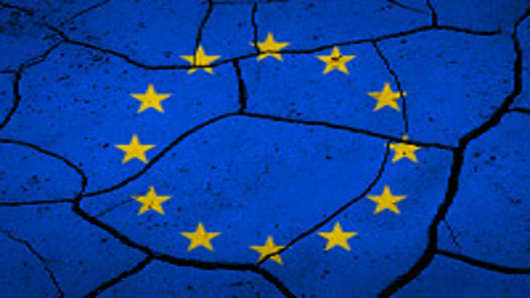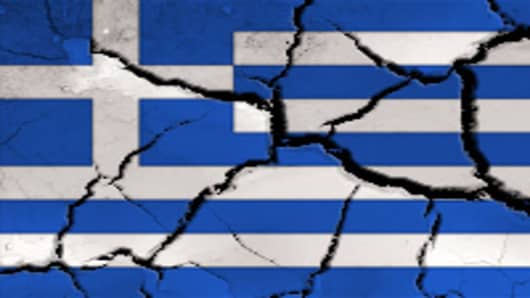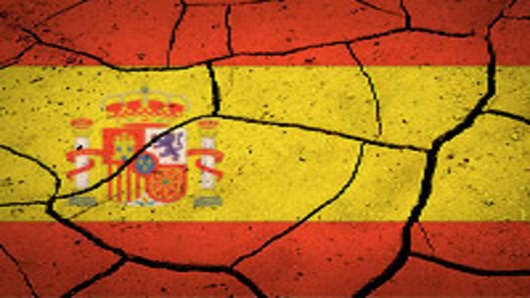has been three years in the making, and its outcome is uncertain.
Crushed by debt and distressed banks, countries like Greece, Spain, and Ireland face ongoing recessions, while Germany and the Netherlands along with members of the International Monetary Fund , push for austerity measures.
There's more than enough reason for concern. The economy of the European Union, which holds the 17 nations that use the euro currency and 10 others, is a larger economic bloc than the United States or China.
To help clarify the situation, here's a look at what's happening now, with updates as they happen, and a look at the major players.
Week of June 18:
Parties committed to Greece's bailout secured a majority on Sunday while leftists who had vied for first place conceded defeat in an election that could keep the debt-laden country in the euro zone.
The conservative New Democracy party held a 2.9 point lead after 97 percent of the ballots were counted. New Democracy had 29.7 percent of the vote, while the leftist Syriza party was running second with 26.9 percent.
How this plays out is still to be determined. Despite the election results, at least on analyst told CNBC that Greece could still leave the euro.
Any hopes Italy and Spain may have had that the Greek election result would ease pressure on their own debt crises were dashed early on Monday when financial markets reacted as if nothing had changed. The cost of borrowing rose for both countries, the two big euro zone economies under fire for poor finances, widening the gap between what they have to pay and what Germany pays.
Week of June 11:
Greeks head to the polls on Sunday, June 17, for a national election with many sayingthe fate of the euro and the recovery of the global economy could rest in their hands. But the biggest pain could be felt closer home as the country suffers through a fifth year of recession.
The last published opinion polls showed the conservative New Democracy party, which backs the 130 billion euro ($160 billion) bailout that is keeping Greece afloat, running neck and neck with the leftist Syriza party, which wants to cancel the rescue deal. (see more on Greece below).
Greeks have been withdrawing cash out of banks to the tune of some $1 billion so far, and stocking up with food ahead of a cliffhanger election on Sunday that many fear will result in the country being forced out of the euro.
Spain's credit rating took another hit on Wednesday. It was downgraded by rating agency Egan-Jones "CCC+" from "B." This is mainly due to Spain getting a bailout for its banks indicating a need for more money to run the country. The downgrade Spain's borrowing costs will go up.
Euro zone finance ministers agreed on Saturday (June 9) to lend Spain up to 100 billion euros ($125 billion) to shore up its teetering banks; Madrid said it would specify precisely how much it needs once independent audits report in just over a week.
Italy is also back in the headlines (see below for more on Italy) as a result of the loan to Spain, over fears the Spanish bailout won't stop the crisis from hitting Italy's already staggering economy.
Because Italy does not have enough economic growth to generate money, the government will probably have to borrow it at high interest rates, adding to an already heavy debt load.
The Major Players
Germany:
As of June 5, Germany indicated it was prepared to accept a 'deal' that would provide greater support for the most indebted euro zone partners in exchange for more centralized control over government spending in Europe.
This is important because Germany has the strongest economy in Europe, and the fourth largest in the world, and plays a leading role in the crisis under Chancellor Angela Merkel—whom many consider the de facto leader of the European Union.
Germany's leadership is said to be 'vital to salvaging the euro as a single currency and stopping a debt crisis that's rattled markets and threatened the global economy.'
Others say Germany has gone way too far in imposing austerity measures on countries like Greece and Ireland.
Criticism of Germany’s handling of the debt crisis goes back to 2010, with some analysts blaming the German government for not stepping in soon enough with aid to stop the Greek crisis.
But Germany has been the biggest contributor in terms of money for bailouts and that has caused some controversy with some Germans—saying they have given enough money to help their fellow Europeans.
Greece, Spain, Portugal and Italy
Greece:
Greece has its fourth government in less than a year after the elections on June 17.
Syriza, the left leaning anti-bailout party, didn't get enough votes to take over parliament. It had threatened to take the country out of the euro and stop the austerity measures.
But the conservative New Democracy party will be in control to form a new government—barley eeking out a win.
Greece got where it is by racking up billions of dollars in debt that it couldn't repay without some sort of help. In February of 2012, the European Central Bank , the European Commission, and the IMF agreed to renegotiate Greece’s debts with lenders and give Greece a $170 billion bailout.
In return, Greece agreed to shrink its deficit with a series of spending cuts and tax hikes. This was the second bailout for Greece in as many years.
But Greece suffers from high unemploymentand an economic slowdown—Greece’s economy is expected to shrink by 6 percent this year—and many of its political leaders as well as the population say the austerity measures are too severe.
There's talk of the country dropping the euro as its currency. Analysts say that Greece could lose 50 percent of its economic output in the first year alone if it dropped the euro. It would also damage the balance sheets of Greek banks and firms as investors and savers would likely withdraw funds in anticipation of a euro exit.
Spain:
In the early 2000s, Spain's economy was considered sound. But a housing bubble developed and the economy took a hit when that bubble burst in 2007.
That created a crisis for Spanish banks holding mortgages and loans it gave out to developers. In late May, Spain's fourth-largest bank, Bankia, announced that it needed $23.5 billion in aid. Spain ended up nationalizing Bankia.
Spain's economy has slowed, its debt has increased, and unemployment has soared to 25 percent.
Recent reports say that Germany was pushing Madrid to accept funds from the European Financial Stability Fundto recapitalize its banks. That push may have worked as noted above.
The current Spanish government had said it was determined to solve its crisis without 'foreign' aid, but that changed with a bailout of euro zone countries for its banks.
Spain has proposed selling Spanish bonds to be used as collateral for paying down its debt.
Many Spanish residents have protested in the streets over the last year because of austerity measures imposed by Madrid.
Ireland:
href="http://news.sky.com/home/world-news/article/15906905" linktype="External" resizable="true" status="true" scrollbars="true" fullscreen="false" location="true" menubars="true" titlebar="true" toolbar="true" omnitrack="false" hidetimestampicon="false" hidecontenticon="false" contenticononly="false"> Ireland was the first European country to go into recession in 2008. Like Spain, this was mainly due to the bursting of a housing bubble. The government then had to back up its own banks with funds as well as foreign banks that had major investments in the country. The government took control of the Anglo-Irish Bank in December 2008. Downgrades of Ireland's credit ratings in 2009 and 2010 made borrowing more expensive. In late 2011, Ireland received $113 billion in bailout funds from the EU and International Monetary Fund. But the trade-off was severe austerity measures—cuts in social spending and tax increases—that has kept the country in recession. Ireland's unemployment rate hovers around 14.3 percent. Research firm Davy has significantly cut its 2012 GDP forecast for Ireland to 0.4percent from a previous number of 1.7 percent. Italy: As we noted above, concerns are growing that Italy could be the next victim of Europe’s financial infection, leading nervous investors to sell Italian stocks and bonds and damping euphoria over the deal to bail out Spain’s banks. Italy's debt problem—it does have a high debt ratio to GDP—isn't related directly to any kind of housing bubble, banking crisis or wild government spending but more toward the fact that the country's economy is at a standstill. Italy's is the third-largest economy in the European Union, but its GDP growth has slowed dramatically since the early 2000s. It plunged below zero during the global recession of 2008 and has barely recovered. Unemployment remains high—at 10.2 percent in April of 2012. As a result, investors are concerned about the country's ability going forward to cover its debt interest payments without incurring ever-higher levels of debt. Those fears, paired with jitteriness over euro zone neighbors like Greece, have forced Italy to pay more and more for credit. Italy's government led by prime minister Mario Monti has promised a new economic policy of balancing the budget, promoting growth, and cutting down on social disparities. That includes overhauling Italy's pension system, fighting tax evasion and cracking down on organized crime. Portugal: Like Spain and Ireland, Portugal has more private debt than public debt. But like Italy, it's economy has been shrinking and that's been the main cause of concern. The Portuguese government projected that the country’s economy would contract by 3.3 percent in 2012. It has an unemployment rate of 13 percent. Portugal's public debt was downgraded in July 2011. But much of the borrowing by Portuguese companies has been financed by Spanish banks. That creates the possibility—and increased worries—of a domino effect, where a financial squeeze in Portugal leads to a bigger crunch in the Spanish banking sector. In April 2011, Portugal got a financial bailout from the European Union worth $115 billion that imposed economic cutbacks to hold down its debt. Other Countries: Great Britain and France have both gone through their share of economic woes but are not considered in any immediate danger of defaulting on loans. France's credit rating was downgraded in January of 2012 and faces higher borrowing costs as a result. It will also affect the euro zone bail-out fund, which is at the heart of efforts to ease fears about the currency bloc, as France is partly responsible for underwriting it. As for Great Britain, it's facing another recession, according to analysts, and higher unemployment—up to three million more people are expected to lose their jobs in England during 2012. The United States and China: Mostly an observer, America's main concern is that Europe's problems could help slow down the U.S. economy even more than it is now—as it struggles from its own recessionary problems. Higher unemployment and less consumer spending in Europe could hurt American companies who depend on foreign sales to boost their bottom line and keep workers at their jobs. But only about 13 percent of U.S. exports go to Europe, and some analysts say slower growth in Europe would put a relatively small dent in the U.S. economy. The Obama administration has talked with its European counterparts about the crisis but so far, the U.S. has done little about it. As for China, it has expressed concern about the crisis but it, too, has offered little in the way of bailout funds.






